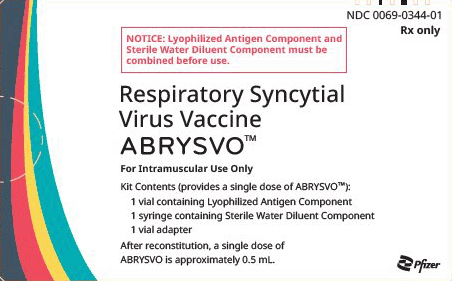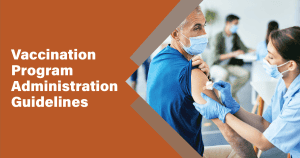FDA Approves First RSV Vaccines
In May 2023, the Food and Drug Administration (FDA) approved the first vaccines for prevention of RSV associated lower respiratory tract disease (LRTD) in adults aged ≥60 years.
RSVPreF3 (Arexvy, GSK) is a 1-dose (0.5 mL) adjuvanted (AS01E) recombinant stabilized prefusion F protein (preF) vaccine.
RSVpreF (Abrysvo, Pfizer) is a 1-dose (0.5 mL) recombinant stabilized preF vaccine.
On June 21, 2023 the Advisory Committee on Immunization Practices (ACIP) recommended that adults 60 years and older may receive a single dose of RSV vaccine, using shared clinical decision-making between the healthcare providers and the patient.
Rationale:
Vaccination with a single dose of the GSK or Pfizer RSV vaccines demonstrated moderate to high efficacy in preventing symptomatic RSV-associated lower respiratory tract disease (LRTD) over two consecutive RSV seasons among adults aged ≥60 years.
Although trials were underpowered to estimate efficacy against RSV-associated hospitalization and death, prevention of LRTD, including medically attended LRTD, suggests that vaccination might prevent considerable morbidity from RSV disease among adults aged ≥60 years.
Epidemiologic evidence indicates that people 60 and older who are at highest risk of severe RSV disease include those with any of the following chronic conditions:
- Lung disease (such as chronic obstructive pulmonary disease [COPD] and asthma)
- Chronic cardiovascular diseases (such as congestive heart failure and coronary artery disease)
- Diabetes mellitus
- Neurologic conditions
- Kidney disorders
- Liver disorders
- Hematologic disorders
- Immune compromise
Other underlying factors that the provider determines might increase the risk of severe RSV-associated respiratory illness may include the following:
- Frailty
- Advanced age
- Residence in a nursing home or other long-term care facility
- Other underlying factors that a health care provider determines might increase the risk for severe respiratory disease
RSV can sometimes also lead to exacerbation of serious conditions such as:
- Asthma
- Chronic obstructive pulmonary disease (COPD)
- Congestive heart failure
Vaccine Timing:
For the 2023–24 season, clinicians should offer RSV vaccination to adults aged ≥60 years using shared clinical decision-making as early as vaccine supply becomes available and should continue to offer vaccination to eligible adults who remain unvaccinated. RSV vaccination is currently approved and recommended for administration as a single dose; sufficient evidence does not exist at this time to determine the need for revaccination.
Coadministration with Other Vaccines:
Coadministration of RSV vaccines with other adult vaccines during the same visit is acceptable. When administering more than one vaccine at the same clinical visit, providers should separate injection sites by at least 1 inch if possible and consider administering vaccines that are associated with an enhanced local reaction in separate limbs. Administering RSV vaccine with one or more other vaccines at the same visit might increase local or systemic reactogenicity.
Data are only available for coadministration of RSV and influenza vaccines, and evidence is mixed regarding increased reactogenicity.
Precautions and Contraindications:
As with all vaccines, RSV vaccination should be delayed for persons experiencing moderate or severe acute illness with or without fever (precaution). RSV vaccines are contraindicated for and should not be administered to persons with a history of severe allergic reaction, such as anaphylaxis, to any component of the vaccine.
Efficacy:
Both vaccines demonstrated moderate to high efficacy in preventing symptomatic RSV-associated LRTD over two consecutive RSV seasons among adults aged ≥60 years, as presented in clinical trials data below.


Safety and Monitoring:
Local and systemic reactogenicity events (related to immune response) reported included local injection site pain, redness or swelling and systemic reactions such as fever, fatigue, headache, nausea, muscle pain, joint pain as well as GI symptoms like nausea, vomiting, diarrhea or abdominal pain. If clinical trials, these adverse effects had a median reported duration of 1-2 days.
Although both vaccines were generally well-tolerated with an acceptable safety profile, six cases of inflammatory neurologic events (including GBS, ADEM, and others) were reported after RSV vaccination in clinical trials, and atrial fibrillation was reported by a higher number of participants that received the vaccines compared to placebo groups.
Post-Marketing Surveillance:
GSK will conduct a study evaluating risk for GBS,
ADEM, and atrial fibrillation after vaccination with
RSVPreF3.

Pfizer will conduct two studies, one evaluating risk for GBS and a second evaluating risk for atrial fibrillation after vaccination with RSVpreF.

Reporting Vaccine Adverse Events:
Adverse events after vaccination should be reported to the Vaccine Adverse Event Reporting System (VAERS). Reporting is encouraged for any clinically significant adverse event even if it is uncertain whether the vaccine caused the event. Information on how to submit a report to VAERS is available at https://vaers.hhs.gov or by telephone at 1-800-822-7967.
Administration:
Both RSV vaccines need to be reconstituted prior to injection and are recommended for intramuscular use only. Following reconstitution, both vaccines can be stored at room temperature for up to 4 hours. Parenteral drug products should be inspected visually for particulate matter and discoloration prior to administration, whenever solution and container permit. Discard if either condition is present. See individual product labeling for additional information.
References:
- CDC. Respiratory Syncytial Virus Infection (RSV) For Healthcare Providers. Reviewed 8/4/23. Available from: https://www.cdc.gov/rsv/clinical/index.html
- Melgar M, Britton A, Roper LE, et al. Use of Respiratory Syncytial Virus Vaccines in Older Adults: Recommendations of the Advisory Committee on
Immunization Practices — United States, 2023. MMWR Morb Mortal Wkly Rep 2023;72:793–801. DOI: http://dx.doi.org/10.15585/mmwr.mm7229a4 - Arexvy (respiratory syncytial virus vaccine) injection package insert. Durham, NC. GlaxoSmithKline Biologicals; 2023 May.
- Abrysvo (respiratory syncytial virus vaccine) injection package insert. New York, NY. Pfizer Inc.; 2023 May.




